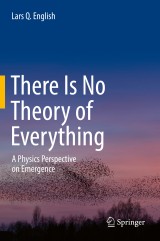Details

There Is No Theory of Everything
A Physics Perspective on Emergence|
50,28 € |
|
| Verlag: | Springer |
| Format: | |
| Veröffentl.: | 14.08.2017 |
| ISBN/EAN: | 9783319591506 |
| Sprache: | englisch |
Dieses eBook enthält ein Wasserzeichen.
Beschreibungen
<div>The main purpose of this book is to introduce a broader audience to emergence by illustrating how discoveries in the physical sciences have informed the ways we think about it. In a nutshell, emergence asserts that non-reductive behavior arises at higher levels of organization and complexity. As physicist Philip Anderson put it, “more is different.” Along the text's conversational tour through the terrain of quantum physics, phase transitions, nonlinear and statistical physics, networks and complexity, the author highlights the various philosophical nuances that arise in encounters with emergence. The final part of the book zooms out to reflect on some larger lessons that emergence affords us. One of those larger lessons is the realization that the great diversity of theories and models, and the great variety of independent explanatory frameworks, will always be with us in the sciences and beyond. There is no “Theory of Everything” just around the corner waiting to be discovered.<div><br></div><div>One of the main benefits of this book is that it will make a number of exciting scientific concepts that are not normally covered at this level accessible to a broader audience. The overall presentation, including the use of examples, analogies, metaphors, and biographical interludes, is geared for the educated non-specialist.<br></div></div>
<div>First Encounters.- Physical vantage points.- Here Come the Philosophers.- A brief history.- Venturing into the Microcosm.- Quantum worlds.- Which way did it go?.- Entanglement and Irreducibility.- Quantum emergence.- The Aggregation of Particles.- The arrow of time.- A Taste of Condensed Matter.- Macroscopic Phases.- Helium-3.- When Matter Reorganizes Itself.- Self-Consistency.- Renormalization.- Phases, protectorates, and emergence.- From crystals to elementary particles.- Beyond the Linear Approximation.- Chaos theory.- Self-organized patterns.- Displays of temporal order.- The Rise of Effective Theories.- A single neuron.- Descending down the rabbit hole.- Re-emerging from the rabbit hole.- Social Emergence.- Social Networks and Norm Circles.- The Wealth of Nations.- Social Beliefs and Downward Causationbsp;Science’s Organizing Pr</div>inciples.- Science and Religion.- Religion and Emergence.- Epilogue.
<div>Lars English is an Associate Professor of Physics at Dickinson College. He received his B.S. in 1996 from Denison University, and a Ph.D. from Cornell University in 2003. His research explores nonlinear phenonmena in complex systems, such as the spontaneous formation of localized patterns in lattices or the synchronization of oscillators.</div><div><br></div><div>Lars enjoys contemplating connections between science, philosophy and spirituality, meditating, hiking in beautiful Pennsylvania, and --most of all--spending time with his wife Anita and three daughters Anya, Chelsea and Nalanda.</div>
<div>The main purpose of this book is to introduce a broader audience to emergence by illustrating how discoveries in the physical sciences have informed the ways we think about it. In a nutshell, emergence asserts that non-reductive behavior arises at higher levels of organization and complexity. As physicist Philip Anderson put it, “more is different.” Along the text's conversational tour through the terrain of quantum physics, phase transitions, nonlinear and statistical physics, networks and complexity, the author highlights the various philosophical nuances that arise in encounters with emergence. The final part of the book zooms out to reflect on some larger lessons that emergence affords us. One of those larger lessons is the realization that the great diversity of theories and models, and the great variety of independent explanatory frameworks, will always be with us in the sciences and beyond. There is no “Theory of Everything” just around the corner waiting to be</div>discovered.<div><br></div><div>One of the main benefits of this book is that it will make a number of exciting scientific concepts that are not normally covered at this level accessible to a broader audience. The overall presentation, including the use of examples, analogies, metaphors, and biographical interludes, is geared for the educated non-specialist.<br></div>
Introduces a broader audience to emergence and the evidence for it within the physical sciences Refutes common misconceptions about science and reductionism Contains approachable explorations of fairly advanced topics, such as quantum entanglement, the second law of thermodynamics and irreversablity, mean field theory, phase transitions and renormalization, nonlinear pattern formation and complexity Discusses these modern topics in the context of emergence as an overarching theme Includes reflections on broader philosophical implications of emergence as informed by the physical sciences Features creative analogies and metaphors, as well as engaging historical and biographical information, to make the subject accessible to the educated non-specialist
Diese Produkte könnten Sie auch interessieren:

Femtosecond Optical Frequency Comb: Principle, Operation and Applications

von: Jun Ye, Steven T. Cundiff

149,79 €















